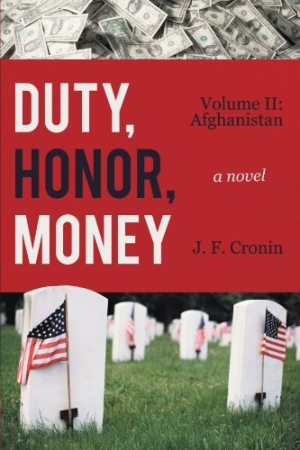Duty, Honor, Money
Volume II: Afghanistan
Duty, Honor, Money is a damn fine war story that does honor to the grunts.
Duty, Honor, Money may just be THE Afghan war novel. Written by a retired marine major general, it is a gritty, authentic tale of men in combat, as well as an exposé on corruption and a lament for brave lives wasted in a war gone horribly awry. Much like Catch-22 or Apocalypse Now, J. F. Cronin’s work is a homage to good soldiers led by bad officers and of men and women caught up in something that is “more a commercial enterprise than a war.”
Cronin starts his novel with a great opening line: “Nothing focuses the attention like the snap of a bullet searching the darkness.” That sentence doesn’t just wake up readers, but grabs them by the collar. For most of the book Cronin rarely lets up on that grip. There are brutal battles and high-tech weapons, but Duty, Honor, Money is about more than men in combat; it is also about how those men have been betrayed, used up, and reduced to being what he calls “expendables in the chase for dollars.”
Duty, Honor, Money is a damn fine war story that does honor to the grunts: the common soldiers (in this case, marines) who fight for each other and want to believe they are serving their country in a good cause. Unfortunately, as the retired marine major general who has written their story believes, that cause is a lost one, criminally flawed by the corruption, greed, ineptitude, and self-serving pride of both the top brass and the Afghan and Pakistani government officials with whom the United States has chosen to ally.
Cronin’s tale focuses on an honest, compassionate, and brave young officer who bucks both the system and the high command to protect his men and get the job done. Lt. Xavier Moran (who goes by “X”) is given a tough, even impossible, mission in which his commanders and supposed allies, notably former American soldiers turned mercenaries for a private security company, are as much if not more the enemy than the Taliban he has been sent to fight.
Most of the American officers, marines, mercenaries, and CIA spooks (as well as the corrupt, slimy, Afghan governor) seem spot-on authentic, but one character, Commander Silva, is too much of a miracle man, getting quite literally a million dollars worth of high-tech gear to a rifle company of marines stuck at a remote outpost at the end of the line. The other characters, however, are all very well written and quite believable. The slimy, corrupt local Afghan governor and the pompous US Army major who serves him—and who is X’s immediate and incompetent superior—are among the best developed and most colorful. The author also does a good job presenting the other officers and marines in X’s command as real people with real concerns, men who feel they have been “pretty much written off,” at least until the hero shows up.
The writing is crisp and lively, as is the dialogue. The pacing is fast for the first sixteen and the last (and twentieth) chapter. While the last fifty pages devolve into a courtroom drama that rehashes the events and confrontations of the first 170 pages, they do serve as the set up for a dynamic conclusion, one that is as gripping as the book’s opening line.
Reviewed by
Mark McLaughlin
Disclosure: This article is not an endorsement, but a review. The publisher of this book provided free copies of the book and paid a small fee to have their book reviewed by a professional reviewer. Foreword Reviews and Clarion Reviews make no guarantee that the publisher will receive a positive review. Foreword Magazine, Inc. is disclosing this in accordance with the Federal Trade Commission’s 16 CFR, Part 255.

